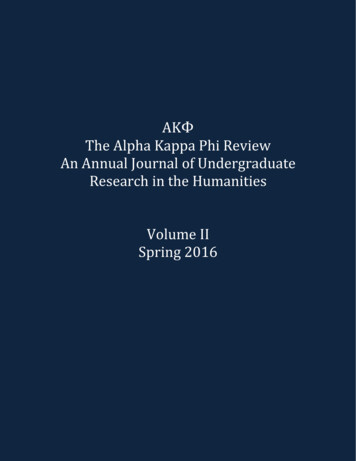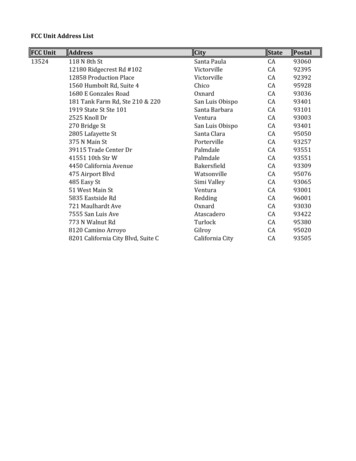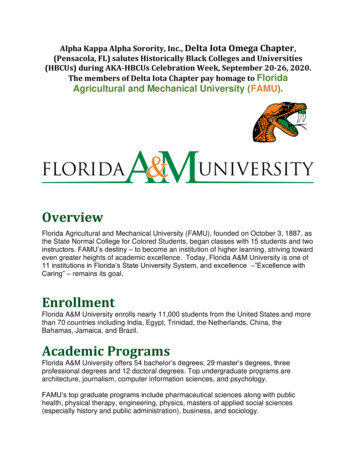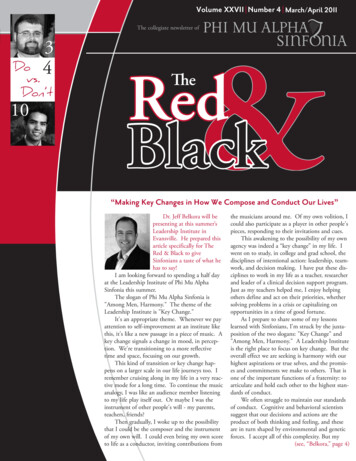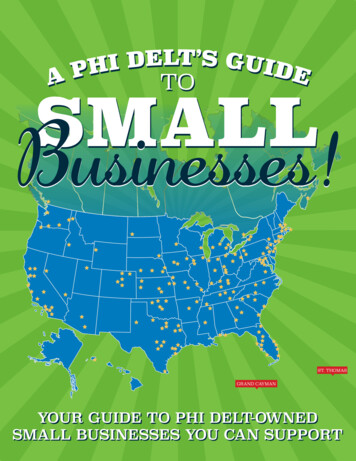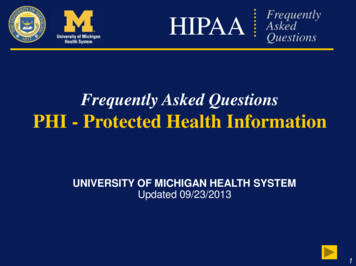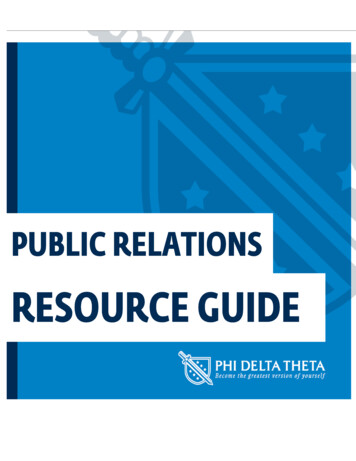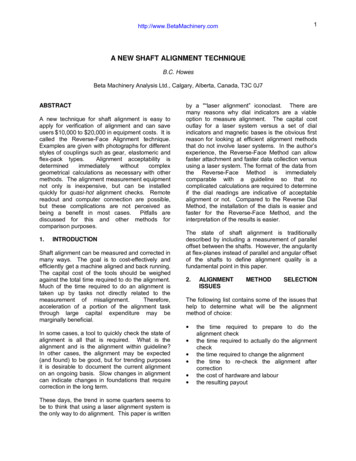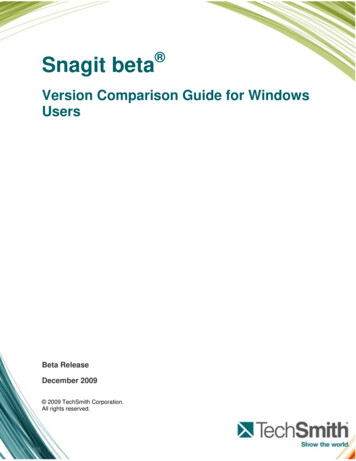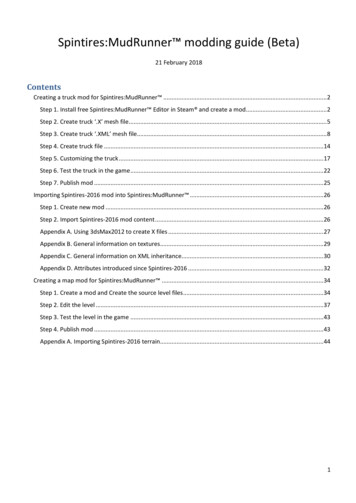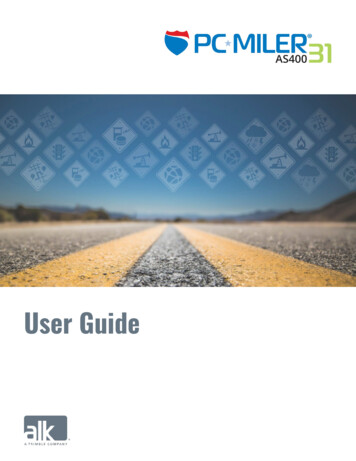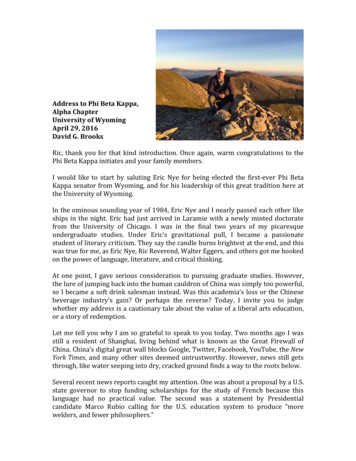
Transcription
Address to Phi Beta Kappa,Alpha ChapterUniversity of WyomingApril 29, 2016David G. BrooksRic, thank you for that kind introduction. Once again, warm congratulations to thePhi Beta Kappa initiates and your family members.I would like to start by saluting Eric Nye for being elected the first-ever Phi BetaKappa senator from Wyoming, and for his leadership of this great tradition here atthe University of Wyoming.In the ominous sounding year of 1984, Eric Nye and I nearly passed each other likeships in the night. Eric had just arrived in Laramie with a newly minted doctoratefrom the University of Chicago. I was in the final two years of my picaresqueundergraduate studies. Under Eric’s gravitational pull, I became a passionatestudent of literary criticism. They say the candle burns brightest at the end, and thiswas true for me, as Eric Nye, Ric Reverend, Walter Eggers, and others got me hookedon the power of language, literature, and critical thinking.At one point, I gave serious consideration to pursuing graduate studies. However,the lure of jumping back into the human cauldron of China was simply too powerful,so I became a soft drink salesman instead. Was this academia’s loss or the Chinesebeverage industry’s gain? Or perhaps the reverse? Today, I invite you to judgewhether my address is a cautionary tale about the value of a liberal arts education,or a story of redemption.Let me tell you why I am so grateful to speak to you today. Two months ago I wasstill a resident of Shanghai, living behind what is known as the Great Firewall ofChina. China’s digital great wall blocks Google, Twitter, Facebook, YouTube, the NewYork Times, and many other sites deemed untrustworthy. However, news still getsthrough, like water seeping into dry, cracked ground finds a way to the roots below.Several recent news reports caught my attention. One was about a proposal by a U.S.state governor to stop funding scholarships for the study of French because thislanguage had no practical value. The second was a statement by Presidentialcandidate Marco Rubio calling for the U.S. education system to produce “morewelders, and fewer philosophers.”
Sitting at my desk in Shanghai, these reports struck a nerve. Frankly, they remindedme of the simplistic Orwellian slogans employed during the Cultural Revolution inChina, a time when blind ideology triumphed over common sense. I was especiallystruck by the story of the Governor trying to kill funding for French studies becauseof another story that is very important to me.In the late 1940s, a boy with round rim glasses and a sturdy crew cut took a busevery day from Sinclair across the plains of southeastern Wyoming to attend highschool in the thriving metropolis of Rawlins. On afternoons after school, the boymade pocket money by catching rattlesnakes in the hills around the little companytown with the big green dinosaur sign that was his world. He was growing up on anisland in a sea of grass and sage. In other words, a typical Wyoming childhood;perhaps some of you share similar stories. This was taking place at the height of anera some call the “American Century.”The boy from Sinclair later attended this university, where his passions pointed himto a major in Speech and Drama, with a minor in French. One thing led, as they say,to another. Due to his academic achievements and his French studies, this child ofWyoming qualified to study in France on a Fulbright scholarship after graduationfrom UW. Following two years in France, he then began a career as a U.S. diplomat.His first posting was in Vientiane, Laos, where his French skills were put toimmediate use. In this tiny country, he earned a reputation for being a “barefootdiplomat,” skilled at engaging people from every walk of society, from village chiefsto senior officials: the antithesis of an “ugly American.”He even took part in a dramatic rescue of American hostages, leading to an awardfrom the State Department in 1960. Even more dramatically, he later married one ofladies he had rescued, a brave girl from Malden, Mass., who was working with theU.S. Agency for International Development in Laos. To this day, his humbleconfidence is the single biggest reason he is my ultimate hero.His time in Indochina led naturally to curiosity about the “big neighbor” to the north,so he started Chinese language studies. This led to a fascinating career as a Chinaexpert representing the United States in our diplomatic re-engagement with Chinabefore, during, and after Nixon’s historic visit in 1972. This re-engagement and the“Open Door policy” it enabled within China proved to be one of the mostfundamental shifts in modern history.So when Eric Nye invited me to speak to Phi Beta Kappa today, it was impossible forme not to think about the story of my father, Stan Brooks. During the lifetime of thelittle boy from Sinclair, China went from being an isolated pauper hiding behind agreat wall to a rising world power. Today, with 20% of the world’s population,China is no longer an isolated, geographically defined territory on a map. “China” (inthe expansive definition of this noun that I prefer to imagine) is engaging with theother 80% of the people in the world in every imaginable way: in-bound and
outbound investment, imports, exports, education, emigration, global warming,regional and global security. In 2016, China is your neighbor for better or for worse,whether you live in Leuven or in Laramie, and whether you intend to learn Chineseor not.As the son of the boy from Sinclair, I lived my father’s life in reverse. After growingup as a child of the world in Taiwan, Nepal, Beijing, and Hong Kong, I decided toattend university here in Laramie. Why? Because despite being raised around theworld, Wyoming was my natural home. This was a transformative choice for me. Asan English major here at UW, I learned a lot about Thomas Hardy and CharlesDickens, tried to decipher Jacques Derrida, and I learned how to write a clearsentence. Footnote: and yes, I learned about rock climbing, rodeo, keggers, andcowgirls, although not necessarily in that order. The University of Wyoming helpedme fill in the pages of my American passport with vivid experiences about what itreally means to be an American living in America. That’s at the core of who I am as aperson.During my junior year, to improve my then basic Chinese language skills, I attendedTaiwan National University on a UW exchange program. Mon Dieu! I even studiedFrench in Hoyt Hall, never imagining that two years later I would fall madly in lovewith a girl from Brussels. Phi Beta Kappa initiates, the lesson is clear: pay attentionin all of your classes, as you never know which subject will provide the most usefulover time!After graduation I leveraged my Chinese language skills to start my working careerin Hong Kong and Shanghai. After disabusing myself of the idea of becoming alawyer, I joined Coca-Cola in China during the early days of the company’s businessthere.During my very first week in the company, I was asked to interpret for Donald R.Keough, the company’s president during a three-day visit to Shanghai. Mr. Keoughwas a charismatic Irishman with a jet-engine voice and a natural talent forconnecting with people. I was a brand new employee with a UW undergrad diplomaand a decent competence in Chinese, but not much else.During our visits to local retail stores on Huaihai Road, Mr. Keough shook hands,smiled for photos, and engaged Chinese customers in his folksy but focused way. Inmany of the stores, he would end the visit by asking the customers if they hadconsidered installing a Coca-Cola fountain unit in their stores. ‘Fountain” as in “sodafountain,” dispensing drinks not from a bottle or can, but from a counter-topdispenser. For the president of a beverage company with the motto of being “withinarm’s reach of desire,” this was a well-honed selling pitch.The first, then the second, then the third Chinese customers were clearly takenaback by Mr. Keough’s friendly suggestion. They all laughed, as Chinese will often do
when embarrassed. In the moment, I ascribed this to a lack of exposure to the waysof capitalism. Mr. Keough looked at me quizzically a few times but let it pass.A few weeks later I realized that my Chinese was good enough to be dangerous, inthis case to my own career prospects! Interpreting for the president of the world’sleading beverage company, I had asked the customers if they would like to have a“large ornamental water fountain” installed in their stores; something moreappropriate to a garden in Versailles or a piazza in Rome than a crowded retail shopin Shanghai! Fortunately, I survived this and many other quixotic mis-adventures.Without a doubt, language skills and a liberal arts education made my careerpossible. As each year of my career passed, I increasingly valued the power oflanguage either to empower breakthroughs or trigger huge misunderstandings.Language is truly at the heart of everything.My liberal arts-based undergraduate education equipped me to have a sensibility forthe wider context for any given situation, and to be curious about how other peopleperceive “reality.” The study of English enabled me to craft meaningful narrativesthat made sense from a Chinese perspective, or South African perspective, or aBulgarian perspective, not just my own.A case in point: in China, the 2008 Beijing Olympics were actually not about eitherBeijing or the 16 days of the Summer Olympic Games. Instead, this was a moment ofaffirmation for Chinese people in the context of the “story” of the past 200 years ofChina’s history, as perceived from their unique perspective. The insights required tounlock this cultural puzzle came directly out of a liberal arts toolkit of skills.My career often involved starting new organizations and teams. Therefore, beingadept at the skills required to create “shared frameworks for meaningful action” hasbeen invaluable. This involves collectively asking and then answering some basichuman questions: Where are we? What is going on? Why? Where do we go next?How will we get there, and how will we work together on the way? It turns out adecent undergraduate degree in English or philosophy makes you well-qualified towrestle with questions like these in a public way.Back to my story: firstly, I don’t believe we were in an “American Century” backwhen my dad was catching rattlesnakes in the hills around Sinclair, or even when Iattended UW in the early ’80s, just a few years before the fall of the Berlin Wall.Secondly, after spending 30 years living and working in China, neither do I believewe are witnessing the cusp of a “China Century,” as some pundits say.Although the United States still has disproportionate economic and culturalinfluence at the end of the day 95% of the people in the world live somewhere else,and most of them think and speak in a native language that is not English. EvenChina, with a stupendous 1.37 billion citizens, is still only 20% of the world’s people,although it is growing more deeply engaged (and entangled) with the other 80%
every passing day. It is true that the “other 95%” spend a lot of time and energytrying to understand us here in America. Some of them speak English, and manyyearn to learn our language. Ultimately, however, our ability to deeply understandother people requires us to engage them on their own terms, and in their ownlanguages.Instead, I believe we are in a “Global Century.” This is a period characterized bytrans-national, global opportunities and challenges. Ask the Tibetan herder with hisiPhone 6, or the Greek islander on the beaches of Lesbos, or the African villagerliving next to a Chinese mining project in Gabon, or the Pacific islander faced withrising sea levels, or the Wyoming rancher affected by changes in global commodityprices. Connectedness and interdependence, in direct and indirect ways, are clearlythe signature themes of our time.In this country, there seems to be a lot of talk these days about building walls. That’ssad, and futile. History tells us that most of the walls we humans have built did nothold back the tides of change for very long. Think of the walls of Troy, or theMaginot Line, or the Berlin Wall. The wall I am most familiar with is the Great Wallof China. It is a truly awe-inspiring barrier, and a wonderful place to hike. Itdeserves to be called “great,” but it did not work: China’s Yuan dynasty was foundedby the Mongols, who came across the wall. China’s last dynasty, the Qing, was alsofounded by invaders from the north, the Manchu.This brings me to the Phi Beta Kappa initiates here today. Instead of wasting ourenergy building walls, we all need to build valuable skills and minds. The Phi BetaKappa members and initiates here today exemplify the value of building skillsthrough their commitment to excellence in the liberal arts. Phi Beta Kappa membersunderstand and respect the power of education.As individuals, and as a country, we need to build the full range of skills required forthis interconnected world. It’s not about a reductio ad absurdum argument about“more welders, less philosophers,” or “less chemical engineering, more languages.”In fact, we need more welders who are comfortable making complex arguments. Iwould modestly propose that we also need more philosophers who know theiracetylene gas from their argon. And if our learned welder can also master Arabic orChinese or Spanish or German or Farsi, that will almost certainly make him or her ahot commodity in the job market.Somewhere along the way, this became a zero-sum debate: “STEM vs. Liberal Arts.”My personal experience tells me this is a false dichotomy. Yes, you do need tograduate with a specific degree. Sadly, PhDs are not normally granted in the field of“undecided.” It does pay to specialize, but that specializing does not mean you needto build a wall around yourself.We need more people with skills learned through a traditional liberal arts course ofstudy, such as
Address to Phi Beta Kappa, Alpha Chapter. University of Wyoming . April 29, 2016 . David G. Brooks . Ric, thank you for that kind introduction Once again, warm congratulations to the . Phi Beta Kappa initiates and your family members. I would like to start by saluting Eric Nye for being elected the first-ever Phi Beta
